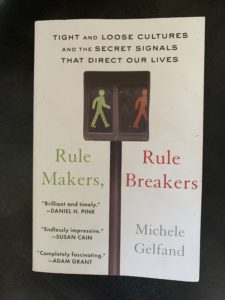 Learning about Rule Makers, Rule Breakers: Tight and Loose Cultures and the Secret Signals That Direct Our Lives has been a memorable experience during the Covid-19 pandemic.
Learning about Rule Makers, Rule Breakers: Tight and Loose Cultures and the Secret Signals That Direct Our Lives has been a memorable experience during the Covid-19 pandemic.
The book’s author, Dr. Michele Gelfand, is a professor in cross cultural psychology at the University of Maryland, College Park. Her 2018 book and her related 2021 research paper are instructive, influential, and useful.
Dr. Gelfand explains how culture clashes generally derive from a key difference: how tightly or loosely we (individuals, organizations, states, countries, etc.) follow social norms.
In late April 2020, a friend about 200 miles away in Greenville, SC alerted me to a virtual lecture, “Rebels vs. Rule Followers: In a Crisis Who Wins?” with Dr. Gelfand that I could watch in Charleston.
Just weeks into the Covid-19 crisis, Dr. Gelfand had already noted the struggles the United States was facing in its Covid response, which she attributed to the country’s loose culture.
While we talk about the U.S. being a country of laws, our social norms tend to favor rule breakers. For example, we lean into ambiguity over precision. We reward risk-taking over playing it safe. We like permissiveness over strictness. And even though the country had shut down for a few weeks, we showed ambivalence about taking measures that would erode individual citizens’ autonomy and liberty.
Dr. Gelfand sounded the alarm about the dangers of our uncoordinated and contradictory actions. And then she and her researchers turned their focus to their specialty. They took advantage of the once-in-a-lifetime opportunity to examine how countries around the world respond to the same collective threat simultaneously, as she explained in an NPR interview.
What a great move! The Lancet Planetary Health published her study The relationship between cultural tightness–looseness and COVID-19 cases and deaths: a global analysis in January. The research suggests that the strength of social norms – that is cultural tightness or looseness – explains the differences in Covid cases and deaths by country. So the secret signals that direct our lives – the subtitle of her 2018 book – has had a life and death impact on us this past year.
For their study, Dr. Gelfand and her team of researchers examined Covid-19 data from 57 countries last fall using the online database “Our World in Data.” The researchers then paired this information with their previous research, the classification of countries using a scale of their cultural tightness or looseness. (The book features these scales.)
The results showed that nations with “looser” cultures, such as the U.S., Brazil and Spain, experienced significantly more Covid-19 cases and related deaths by October than Asian countries such as South Korea, Taiwan and Singapore. These countries with their “tighter” cultures follow strict norms and are willing to punish deviance.
If you’re interested in how individuals, organizations, communities, and nations are shaped by their culture and the range of social norms that exist, I definitely recommend her book.
Here’s why and how I’ve found it so valuable in my work:
- Based on her extensive research in more than 50 countries, Dr. Gelfand agrees with the neuroscientists. Our behavior is highly influenced by the perception of threat. This helps explain how individuals act in the moment and how our behavior has been shaped over hundreds of years and generations.
- Ecological and historical threats – real or perceived – around disasters (drought, hurricanes, wars, etc.) and plagues (smallpox, insect manifestations, famines, etc.) tend to push countries and groups to band together. They operate with tighter norms to preserve depleted resources and avoid chaos. Based on their experiences, Japan and Singapore tend to be rule makers.
- Countries and groups that experience mobility, diversity and more contact with outsiders prefer looser norms. For instance, the United States, with oceans on two coasts, rich agricultural land, and home to many immigrants, tends to be loose. However, the loose-tight spectrum varies by state.
- These age-old external forces have calibrated the social codes of countries (and within the U.S., certain states). Tight social norms work to encourage greater cooperation to protect against external threats and maintain order. By contrast, loose social norms provide fertile ground to innovate and promote individual freedoms.
- In today’s VUCA (volatile, uncertain, complex and ambiguous) world, adaptation is a helpful skill. Those who have ambidexterity and can flex between tight and loose benefit. Consider New Zealand, which was able to tighten up when Covid started and then loosened again when the threat diminished. If more of us knew about this tight-loose framework, we may be better equipped to understand why and how to flex.
- Meanwhile, I’m finding this tight-loose framework useful in a range of situations, especially for expats right now. In combination with other cultural tools, I’m using the tight-loose framework to explain the differences among the expats’ home country, the United States, and their new home in the deep South, which tends to be tighter than the rest of the U.S.
Thank you, Dr. Gelfand, who’s joining the faculty at Stanford this fall. By using a variety of research methods — field, experimental, computational, and neuroscience methods — she’s helping us better understand the evolution of culture and its consequences on us. And this understanding can arouse greater empathy for others too.

0 Comments